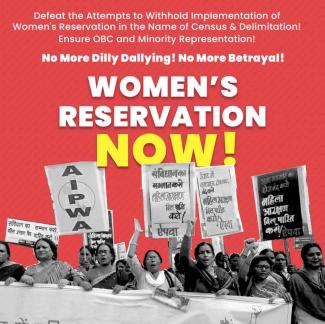Why Can’t Women’s Reservation Be Implemented in the Next Election?
AICCTU Statement on Women’s Reservation Bill
The Women’s Reservation Bill or the The Constitution (One Hundred and Twenty Eighth Amendment) Bill, 2023 has been passed from both Loksabha and Rajyasabha. Ensuring women’s reservation in all decision making bodies, including the Parliament and State Legislative Assemblies, has been a long standing demand of the progressive women’s movement in the country. The present bill passed from the Parliament says 33% seats in Loksabha and Vidhan Sabha will be reserved for women. While a special session of parliament was called and the Women’s reservation Bill was presented to show seriousness of the government on the issue, in reality the bill promised no deadline for implementation of the provisions of reservation. The AICCTU supports women’s reservation in all legislative bodies and would like to raise the following concerns in regard to the Bill passed by the parliament:
- Why has the implementation of Women’s Reservation been made contingent upon the next census and subsequent delimitation of electoral constituencies? It is to be noted that it is the first time in the history of independent India that the decadal census has not been conducted. While the Pandemic is being given as an excuse by the Indian government, several other countries have successfully conducted their census in this period. One obvious question then arises is why is the implementation of Women’s Reservation being made contingent upon exercises that themselves are very uncertain? Why can the reservation not be implemented in the next election? The real intention of the government becomes clear by the blatant dilly-dallying tactics in implementation of the reservation.
- Another pertinent question that must be asked is why the Bill restricts Women’s Reservation to Loksabha and Vidhansabhas. Why has the reservation not been extended to Rajya Sabha and Vidhan Parishads?
- The Bill does not address the concerns in regard to representation of women from the OBC and minority communities. It indeed indicates the anti-social justice nature of the present incumbent regime that enjoys a huge majority in the Parliament. It could have addressed the long ignored question of representation of OBCs and minorities in our legislative bodies.
By denying women’s reservation in the next election, the Modi government is trying to please the patriarchal constituency emboldened under the present regime. The assault on women’s rights, freedom and autonomy has intensified in the last nine years. The present regime has created a shameful track record of shielding accused of sexual assault and rape. From Kathua, Unnao to Brij Bhushan Saran, the prime accused in complaints of sexual harassment by women wrestlers, the party in power has every time used the governance machinery and political muscle to defend those accused of assaulting women. And at each such instances, the women complainants have been at the receiving end of government sponsored attacks and silencing. We can imagine why the tactics of delaying implementation of women’s reservation indefinitely have been adopted by the Modi government.
It is under the same regime that women’s labour has been devalued and derecognised consistently. Millions of scheme workers of the country, who are mainly women workers, are being denied basic minimum recognition as workers. It is these women workers who tirelessly work to run important schemes of the government like the NRHM, Mid Day Meal and the ICDS. Yet, these women are not even paid minimum wages. They are being denied proper remuneration for their services during the pandemic. Women are pushed into the unorganized workforce, to work under vulnerable working conditions. Millions of other women continue to work without any rights guaranteed. Domestic workers, a workforce that is largely constituted of women do not have any recognised rights. Their salary, service condition, safety at work place - nothing is guaranteed under the law of the land. The four labour codes brought in by the government further dilute women’s rights as workers, even denying them equal remuneration. It is under this regime that a glaring gender gap of 41% has been reported in salaried employment in 2019-20. Economic sectors where women are majorly engaged have the most precarious work condition.
Denial of equality to women have to be curtailed immediately. The AICCTU demands that Women’s Reservation be implemented in the next election with a much wider scope to include women from OBC and minority communities.

